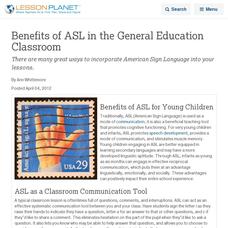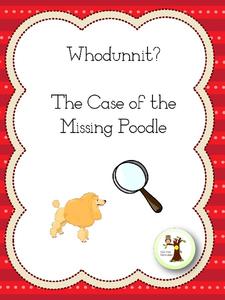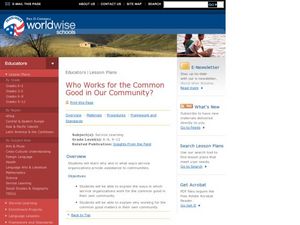King Country
Lesson 7: Relationships - Day 5: Acquaintances & Strangers
What is the difference between a friend and an acquaintance? What about an acquaintance and a stranger? As part of a unit on Family Life and Sexual Health (FLASH), class members role play appropriate responses to situations involving...
Curated OER
Benefits of ASL in the General Education Classroom
There are many great ways to incorporate American Sign Language into your lessons.
Colorado Unit Writing Project
Simple Machines
Planning an elementary science unit has never been simpler! These twelve lessons guide young scientists through an exploration of simple machines and their many uses in the real world before asking them to apply their learning in the...
Tick Tock Curriculum
Whodunnit? The Case of the Missing Poodle
Who purloined the poodle? Class groups read police reports and theorize whodunnit. The sixth of a ten-lesson series on mysteries.
Curated OER
Resources & Review, Day 2: Summary Session
Review all the concepts covered in your special education class related to sexual health and safety. Students answer what they learned, what they liked, and what they'd like to learn in the future regarding health and safety. They each...
Curated OER
Who Works for the Common Good in Our Community?
Students identify community organizations that help those in need. In this service learning lesson, students listen to members of local service organizations present information. Students write journal entries based on the information...
Curated OER
Introduction to Edgar Allan Poe
Before reading Edgar Allan Poe's "The Raven" in your class, walk learners through this scavenger hunt that teaches them about Poe's life and works. Though the lesson is designed for 15:1 special education class, it could work in any...
Curated OER
Making Inferences - An Introduction
Help your learners identify the inferences they make every day with this SMART board lesson. With a comic strip in the first presentation slide, they make inferences about the situation. A discussion addresses what type of prior...
Curated OER
Home Living/Life Skills: Face Washing
Having good hygiene skills is a very important part of living an independent life. Learners with special needs follow sequencing cards to practice washing their faces. They follow each step in the process and discuss the importance of...
Curated OER
Basic Paragraph
Students with special needs examine how to write an organized, basic, five-sentence paragraph. Students write a paragraph with a topic sentence, supporting sentences and a concluding sentence. They first practice by viewing and...
Curated OER
Including the Disabled Student
Students read and discuss the history of special education in public schools related to the Individuals with Disabilities Education Act. Students work in groups to design ways to modify classroom activities based on the needs of a...
Curated OER
Impressive Impressions
Students in a special education classroom examine the various types of molds made by natives. As a class, they brainstorm a list of the types of molds that are made today by different processes. They are given an amount of clay in which...
Curated OER
Much-Loved Velveteen Rabbit
Students in a special education class are read "The Velveteen Rabbit". Using construction paper, they draw two of their own rabbits making one look shabby and one brand new. To end the activity, they use markers to color the rabbit and...
Curated OER
Who's Hooting?
Students in a special education class examine the nocturnal animals in their local area. Individually, they use the internet to research owls and share it with the class. To end the lesson, they use construction paper to make a...
Curated OER
All About Antarctica
Students research the continent of Antarctica to find important facts about its topography, resources, climate, industry, agriculture, and wildlife. They identify Antarctica's animal life and learn what special needs and habitats these...
Curated OER
The Moomba Festival
Learners study an Australian festival, Moomba. They research early tram usage, power sources and construct 3-D tram for their own tram parade. They decorate large recycled boxes, such as refrigerator boxes, as trams. Younger children and...
Curated OER
Note Cards
This is a very simple idea, learners make note cards or stationery out of their recycled art work. Note: I have done a version of this, where I've had my special needs learners paint on card stock or watercolor paper. I then cut each...
Curated OER
A Vacation Expedition: Universal Design and Differentiated Instruction Lesson
Learners plan a vacation to either a mountain, deep-sea location, rainforest or to the moon. In this vacation planning lesson, students research information about the location of their choice. They watch video clips on the SMARTBoard,...
Curated OER
Special Delivery—Handle with Care
Students explore the concept of philanthropy. In this service learning lesson plan, students visit a retirement home with their classmates. Students deliver cards and plants to the residents there.
Curated OER
Sahara Special
Third graders read the book Sahara Special and participate in comprehension activities. In this realistic fiction instructional activity, 3rd graders create a brochure for where they live. Students have personal bags, a brown paper bag,...
Curated OER
Pairing Up: The Importance of Peer Partners
Encourage relationships between classmates with varying academic and social needs.
Perkins School for the Blind
Design and Problem Solving
What if you had a design problem you wanted to solve, but were unable to draw because you were unable to see? Teach your learners with visual impairments that they can use Wikki Stix®, a braille ruler, Legos®, and Constructo Straws to...
University Interscholastic League
English Lesson to Prepare for UIL Spelling and Vocabulary Contest
"i before e. . ." Spelling is easier if kids know the eight basic spelling rules contained in this resource packet.
University of California
You Are What You Eat: Testing for Organic Compounds in Foods
We have all heard that we are what you eat, but what are we eating? An informative lesson opens with a discussion of the foods pupils have recently eaten. Then, young scientists perform four experiments on seven different foods to...

























